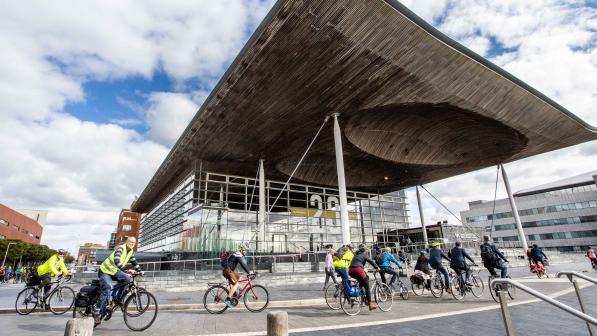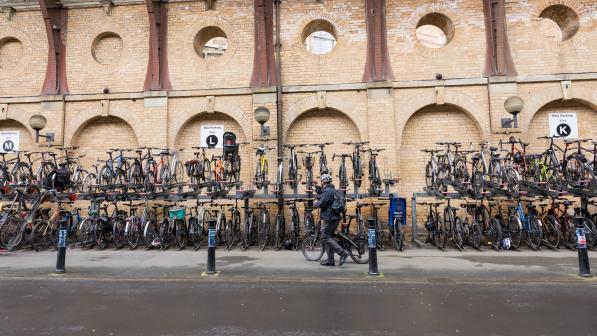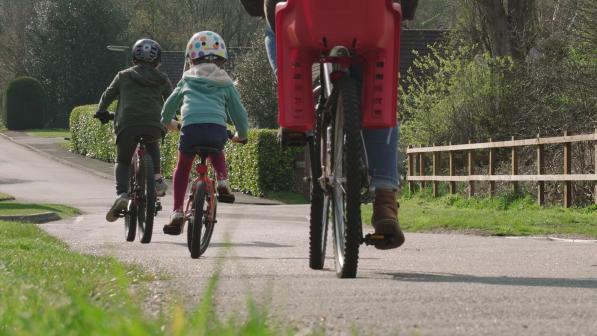Show us the money – for more cycling

When we’re lobbying governments to increase their investment in cycling, we need to be persuasive but we also have to be professional. I do, though, sometimes hear my inner self screaming at me like Cuba Gooding Jr in the film Jerry Maguire.
When negotiating for a better deal, his character’s approach was to repeat one demand increasingly loudly: “Show me the money!” Officials and politicians often agree with us effusively about the benefits of spending more money on cycling. But actions – and budgets – speak louder than words.
There are things local authorities can do to enable more people to cycle that don’t require significant central government funding. It’s relatively inexpensive to: lower speed limits to 20mph; restrict motor traffic outside schools at certain times; prevent through traffic in residential areas; or provide more cycle parking.
Connected networks of protected cycle lanes, although cheap in comparison with road building or other transport infrastructure, cost more. Delivering those networks requires more significant and long-term investment. It’s what the Dutch have been doing for decades. Campaigning for funding for cycling has been a key part of our advocacy work for many years.

The headline demand in our manifesto for the 2024 general election was a commitment to invest in cycling and walking by allocating 10% of total transport budgets to them. With many transport issues being devolved, we have been pressing the governments in all four home nations on this – especially in the last few months.
Scotland
I’m writing this in February 2005, just after the Scottish budget for next year had been passed. In December 2024 the Scottish government published a draft budget, proposing to cut the active travel budget by £31 million.
We’ve been lobbying politicians ever since, and our supporters in Scotland used our online campaign action to send thousands of emails to their MSPs. Sadly, the proposed cuts have now been confirmed.
It’s worth noting that Scotland is still investing more per person than any other nation in the UK, and has significantly increased that investment year on year – until this year. In May 2026 the Holyrood elections present further campaigning opportunities to push for increased investment.
Northern Ireland
Unlike Scotland, where ongoing progress has been hamstrung by cuts, Northern Ireland has yet to get out of the starting blocks.
The 2022 Climate Change Act (NI) looked promising. It imposes a legal commitment on the Department for Infrastructure to develop sectoral plans for transport, with a minimum spend on active travel of 10% of the overall transport budget.

Three years on, there’s no sign of a sectoral plan, investment in active travel remains the lowest in the UK and progress has been glacial. However, in December 2024 the Department of Finance launched a consultation on the next year’s budget.
We’re still waiting for confirmation of the final budget, but through our campaign action, members and supporters have been pushing their MLAs for a timescale and plan for active travel investment to be ramped up to that 10% target.
Wales
And so to Wales. We’ve praised many of its decisions and policies, from the Active Travel Act to the introduction of a default 20mph speed limit. Wales has also, slowly but consistently, been increasing the funding allocated to active travel.
Allocate is the key word, because changes to the way funding is allocated in Wales mean that it’s not clear from the draft budget published in December just what money is being assigned to cycling and walking.
Budget lines are unclear, and money for active travel seems to fall within wider funding streams, making it difficult to discern exactly what’s available for or likely to be spent on active travel.

We’ve been pressing for clarification on the budget figures for the last two months. Our supporters have too, through one of six separate actions we’ve set up since December to help people let politicians know they want more money spent on cycling, wherever they live in the UK.
England
I’ve left England until last because I wanted to end with some cautious optimism, although I’ll caveat that by saying that funding for cycling is inadequate across the UK.
Last year Cycling UK instructed independent think-tank IPPR (Institute of Public Policy Research) to produce a report on the levels of funding needed in England to achieve government targets to increase levels of cycling. It supported our calls for the allocation of around 10% of the transport budget.
When the report was written, we were still dealing with the consequences of a decision that the last government made to cut active travel funding by £233 million (around 70%).
The current government inherited that legacy, and we’ve been furiously lobbying to reverse those cuts and then increase funding further. In October 2024 the government took the first steps towards that, announcing a further £100 million for active travel in the autumn budget.
It’s not enough. It doesn’t fully reverse the cuts. Yet it’s a welcome first step.

Sadly, one-year budget increases tend to lead to one-year funding settlements for local authorities. It’s hard for councils to then plan and deliver connected networks of separated cycling routes without some assurance regarding long-term funding.
In Westminster, the government has been consulting on a multi-year spending review, which is expected to be published in June 2025.
A major part of our influencing work in Westminster in recent months has therefore been to make the case for increased and long-term funding for cycling. Once again, thousands of you have used our campaign actions to support this.
So that’s my whistle-stop tour through budgets, spending reviews and investment in cycling across all four nations. Some ups, some downs, but there’s been progress in every nation since I started working at Cycling UK. I only wish it were quicker.
With your support, we’ll continue to (politely) ask politicians to show us the money.
Cycle magazine
Every two months Cycling UK members receive Cycle magazine, filled with interesting and informative articles, news and reviews for all cyclists.
Members can read the magazine in full online; non-members can read selected highlights.


